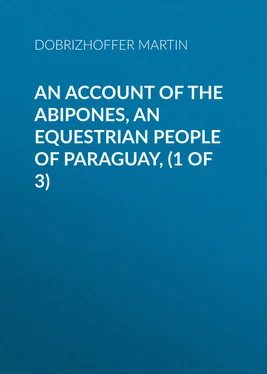Martin Dobrizhoffer - An Account of the Abipones, an Equestrian People of Paraguay, (1 of 3)
Здесь есть возможность читать онлайн «Martin Dobrizhoffer - An Account of the Abipones, an Equestrian People of Paraguay, (1 of 3)» — ознакомительный отрывок электронной книги совершенно бесплатно, а после прочтения отрывка купить полную версию. В некоторых случаях можно слушать аудио, скачать через торрент в формате fb2 и присутствует краткое содержание. Жанр: foreign_antique, foreign_prose, на английском языке. Описание произведения, (предисловие) а так же отзывы посетителей доступны на портале библиотеки ЛибКат.
- Название:An Account of the Abipones, an Equestrian People of Paraguay, (1 of 3)
- Автор:
- Жанр:
- Год:неизвестен
- ISBN:нет данных
- Рейтинг книги:3 / 5. Голосов: 1
-
Избранное:Добавить в избранное
- Отзывы:
-
Ваша оценка:
- 60
- 1
- 2
- 3
- 4
- 5
An Account of the Abipones, an Equestrian People of Paraguay, (1 of 3): краткое содержание, описание и аннотация
Предлагаем к чтению аннотацию, описание, краткое содержание или предисловие (зависит от того, что написал сам автор книги «An Account of the Abipones, an Equestrian People of Paraguay, (1 of 3)»). Если вы не нашли необходимую информацию о книге — напишите в комментариях, мы постараемся отыскать её.
An Account of the Abipones, an Equestrian People of Paraguay, (1 of 3) — читать онлайн ознакомительный отрывок
Ниже представлен текст книги, разбитый по страницам. Система сохранения места последней прочитанной страницы, позволяет с удобством читать онлайн бесплатно книгу «An Account of the Abipones, an Equestrian People of Paraguay, (1 of 3)», без необходимости каждый раз заново искать на чём Вы остановились. Поставьте закладку, и сможете в любой момент перейти на страницу, на которой закончили чтение.
Интервал:
Закладка:
To the government of Buenos-Ayres belong the cities of Santa Fé and Corrientes; the one on the east, and the other on the west shore of the Parana. The former is the handsomest and most opulent. From its trade in divers articles, and from its countless herds of cattle, it amasses wealth to a great amount. In former years, it was almost razed to the ground, and thus reduced to solitude, by the barbarous Abipones, Mocobios, Tobas, and Charruas. The more valuable and remoter estates were entirely destroyed; slaughters were committed, in the very market-place, at mid-day; and it was provided by law, that no one should enter the church, unless armed with a musket. But after we had founded the colonies of S. Xavier, S. Jeronymo, Concepcion, S. Pedro, and S. Pablo, this city began to take breath, and, flourishing again, returned the security it had previously received. Before, behind, and on both sides, it is bounded by rivers, which, when they overflow, threaten destruction to the inhabitants, but are, at other times, extremely beneficial to them.
Its latitude is 31° 46´. From Buenos-Ayres, its distance is reputed to be an hundred leagues.
The other city, which the Spaniards call De las Siete Corrientes, takes its name from seven points of the rock jutting out into the Parana, against which the current breaks with great violence, and flowing on very rapidly, carries down ships, coming up the stream, unless in full sail under a strong wind. A row-boat, in the passage of the river, must make many windings to avoid the rapidity of the current, as I have often experienced: for hard upon the city, the great river Paraguay flows into the still greater river Parana, the one changing its course, and the other its name. For the Parana, rolling on from east to west, when joined to the Paraguay, hurries down in a southerly direction with it. The Paraguay loses its name for that of the Parana after its junction with that river. It is inconceivable with what a mass of water these conjoint streams roll proudly down in one mighty channel. If you did not see the banks, you might fancy it a sea. This place, in name alone a city, and unworthy of the name, is chiefly composed of mud-hovels, with roofs of palm-leaves. The inhabitants are remarkable for their beauty, fascinated by which, many of the Europeans are entangled in marriages, which they repent for the rest of their lives. The women destroy themselves with labour, weaving, and exquisitely embroidering garments, which they call ponchos. The men are naturally agile, lively, and expert in horsemanship; but, from their indolence and love of ease, are oppressed with poverty, when they might abound in every thing, if they but knew how to improve the fertility of the soil, and the advantages of the river. The Abipones, who had long afflicted the neighbourhood with slaughter and rapine, being at length subdued, and settled in the new colony of St. Ferdinand, the inhabitants revived after they had entertained thoughts of deserting the city, and the use of the fields and woods, on the other side of the river, was restored them. These last, being stocked with noble trees, afford excellent materials for building ships and waggons. The fields supply pasturage for cattle of various kinds. The inhabitants derive considerable profits from these sources; gains which the daily fear of assailing savages deprived them of. The lat. of the city is 27° 43´, its long. 318° 57´.
In the jurisdiction of the Governour of Buenos-Ayres, are also thirty Guarany towns, on or near the banks of the Parana, the Uruguay, and the Paraguay. By geographers they are called Doctrines, or the land of Missions; but the ignorant or malicious style them, in their books, the kingdom of the Jesuits, a republic rebellious to the Catholic King, painting them in the blackest colours which envy and unbridled calumny can suggest. Let me be excused, if to manifest the falsehood of their calumnies, I mention the following facts: – That the Jesuit missionaries have ever left Europe at the expense of the Catholic King, for the purpose of founding new colonies, and preserving the old – that they are supported by an annual stipend from the royal purse – that the Guaranies pay yearly tribute to the King – that a century before as many thousands as were appointed, fought in the royal camps without any stipend, whenever they were called upon by the royal governour – that the parishes are visited by the Bishops as often as seems good – that the Bishops are honourably received, and splendidly entertained, it may be for many weeks – that the castles of Buenos-Ayres and Monte-Video were built under the direction, indeed, of the Spaniards, but by the labour of the Guaranies – that the royal army consists chiefly of the Guaranies, under our authority, which were ruled by a few Spaniards, as the body by the soul, in every undertaking against the warlike savages, against the Portugueze and their town of Nova Colonia, so often attacked and taken, or against the insurgents of the city of Concepcion. The Guaranies were governed by the Jesuits, to whose care they were intrusted by the Catholic kings, not as slaves by their masters, but as children by their parents; and these towns were conducted in a manner precisely conformable to the royal laws.
By the labours of nearly two centuries, the Guaranies, formerly wandering cannibals and obstinate enemies to the Spaniards, have been reduced to civilization, to religion, and to the sceptre of the Catholic King. With what labour, what expense of lives the Jesuits have effected this – how infinitely these thirty towns surpass the other American tribes in the number of their inhabitants, in Christian morality, in the splendour of their churches, in their prompt loyalty, in mechanical skill, in arts, and in military activity, you may learn from the letters every where published of the kings, the royal governours, and the Spanish bishops; from the works of Doctor D. Francisco Xarque, Dean of Albarrazin, an eye-witness, of the learned Abbot Antonio Muratori, and an anonymous Englishman, whose book was translated from English into German, at Hamburgh, in the year 1768. This work gave me great pleasure, though it sometimes made me smile, especially where the author says, "We Europeans doat when we blame the Jesuits of Paraguay. It were better to deliberate how we may bring about in Europe, what they effect among the Guarany Indians without violence and without money. In their towns, each labours for all, and all for each. Without needing to buy or sell, every one possesses the necessaries of a comfortable subsistence, victuals, lodging, medicine, and education. Money wanting, all is wanting, say the Europeans; the Guaranies, on the other hand, though destitute of gold and silver, though unacquainted with any kind of money, daily experience the truth of the aphorism, Dii laboribus omnia vendunt , God gives every thing to labour. Proportioning the task to their age, their sex, and their strength, they are always employed, never oppressed with labour. Of luxuries they are ignorant, superfluity they know not, yet are happier in their contentment than the wealthiest in their opulence. He is not prosperous to whom much abounds, but whom little suffices. The Jesuit priests are curates not of the souls, but of the bodies of the Guaranies." Being in subjection only to the Catholic King and the royal governours, not in dreaded slavery amongst private Spaniards, like the other Indians, the towns increase wonderfully every year in population under our care, and fresh towns were now and then added to the old ones. In the year 1732, 141,252 inhabitants were reckoned in the thirty colonies of the Guaranies; but the small-pox breaking out soon after, cut off thirty thousand of them. Some time after it returned again, but in a milder form, and eleven thousand only were its victims. The measles, likewise, so fatal to Americans, made repeated ravages to a frightful extent. I write from experience in both, for in my office of priest, I attended the sick of the small-pox and measles, day and night, for many months. Famine, also, arising from the continued drought and consequent density of the land, filled the tombs with Guaranies. Add to these, the victims of war in the royal camps, where five, and sometimes six thousand men were detained. In 1767, when we bade America farewell, there were about an hundred thousand numbered in these towns. M. Louis Antoine de Bougainville, in his work entitled Voyage autour du Monde , printed at Neufchatel, in the year 1772, must be read with caution. He loads the Jesuits with egregious praises, but by and bye relates a thousand things as contrary to truth as dishonourable to us and the Guarany colonies. Pessimum inimicorum genus laudantes , says Tacitus, in the life of Agricola. I would not, however, willingly believe that an author, the distinguished favourite of Mars, of Neptune, and, unless I am deceived, of all the Muses, is to be classed with these knaves. True it is, he wrote falsely concerning us and the Guaranies; but rather deceived by the narrations of others, than through envy or malice. He never even saw the Guarany towns from a distance. I wish he had seen them! he would have painted the Indians and their missionaries in fairer colours. A little while, and but a little while, he remained in Buenos-Ayres, the port and threshold of Paraguay. There he drew the very worst notions, from the very worst sources, and gave them to Europe as the undoubted truth. Alas! alas! the friendliest well-wisher could not then, without danger, advocate our cause. The rising, not the setting sun is praised by the multitude, and such was then our fate. A Spaniard of no despicable authority has opened his mind in these words: "If every thing else which M. de Bougainville has written on the other provinces be as false as what he has said concerning Paraguay, let his history be carried to the spice shop to wrap pepper; yea, to a meaner office."
Читать дальшеИнтервал:
Закладка:
Похожие книги на «An Account of the Abipones, an Equestrian People of Paraguay, (1 of 3)»
Представляем Вашему вниманию похожие книги на «An Account of the Abipones, an Equestrian People of Paraguay, (1 of 3)» списком для выбора. Мы отобрали схожую по названию и смыслу литературу в надежде предоставить читателям больше вариантов отыскать новые, интересные, ещё непрочитанные произведения.
Обсуждение, отзывы о книге «An Account of the Abipones, an Equestrian People of Paraguay, (1 of 3)» и просто собственные мнения читателей. Оставьте ваши комментарии, напишите, что Вы думаете о произведении, его смысле или главных героях. Укажите что конкретно понравилось, а что нет, и почему Вы так считаете.












